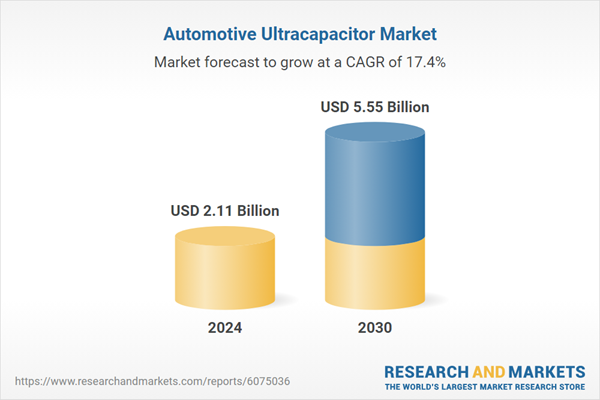Speak directly to the analyst to clarify any post sales queries you may have.
10% Free customizationThis report comes with 10% free customization, enabling you to add data that meets your specific business needs.
Technological advancements, including graphene-based electrodes and hybrid capacitor designs, are enhancing energy density, charging capabilities, and lifecycle performance, making ultracapacitors more viable for mainstream automotive use. The push for sustainable transportation and lightweight energy storage is also accelerating market adoption. OEMs are investing in ultracapacitor-based power management systems to enhance vehicle performance and reduce emissions. Strategic collaborations and the rise of connected and autonomous vehicles are further expanding ultracapacitor applications in modern mobility systems.
Key Market Drivers
Surging Adoption of Electric Vehicles (EVs)
The global shift toward electric mobility is significantly driving demand for ultracapacitors. As EV adoption grows, automakers are incorporating ultracapacitors to complement batteries by providing rapid charge-discharge capabilities and improved power delivery. Ultracapacitors are especially effective in regenerative braking systems, aiding energy recovery and extending battery life. With global EV sales increasing - highlighted by a 49% surge in the first half of 2023 - automakers are seeking high-performance, efficient energy storage solutions. Leading EV markets such as China, Europe, and the U.S. are boosting the need for advanced power systems, where ultracapacitors play an essential role in enhancing efficiency and acceleration response.Key Market Challenges
High Upfront Cost Relative to Conventional Batteries
Despite their performance benefits, ultracapacitors are more expensive than traditional energy storage technologies like lithium-ion and lead-acid batteries. The use of advanced materials and precise manufacturing processes contributes to higher production costs. While ultracapacitors offer advantages such as faster charging and longer durability, the initial expense remains a barrier, especially in price-sensitive automotive segments. Although manufacturers are working on cost-reduction strategies through scale and material innovations, affordability continues to challenge widespread adoption.Key Market Trends
Emergence of Hybrid Ultracapacitors
Hybrid ultracapacitors are gaining momentum as they merge the power density of traditional ultracapacitors with the energy storage capabilities of lithium-ion batteries. These devices offer a balanced solution for applications requiring both quick energy bursts and sustained output. R&D efforts are enhancing energy retention, capacity, and lifespan, positioning hybrid ultracapacitors as a transformative solution in automotive energy systems. This technology is increasingly seen as essential for future vehicle platforms where efficiency, reliability, and performance are top priorities.Key Market Players
- Maxwell Technologies
- Skeleton Technologies
- Panasonic Corporation
- Nesscap Battery
- Nippon Chem-Con Corporation
- Hitachi AIC Inc.
- ELNA America Inc.
- LOXUS Inc.
- Yunasko Ltd
- Nichicon Corporation
Report Scope:
In this report, the global Automotive Ultracapacitor Market has been segmented into the following categories, in addition to the industry trends which have also been detailed below.Automotive Ultracapacitor Market, By Vehicle Type:
- Passenger Cars
- Commercial Vehicle
Automotive Ultracapacitor Market, By Application:
- Start-Stop Operation
- Regeneration Braking System
- Other
Automotive Ultracapacitor Market, By Sales Channel:
- OEM
- Aftermarket
Automotive Ultracapacitor Market, By Region:
- North America
- United States
- Canada
- Mexico
- Europe & CIS
- Germany
- France
- U.K.
- Spain
- Italy
- Asia-Pacific
- China
- Japan
- Australia
- India
- South Korea
- Middle East & Africa
- South Africa
- Saudi Arabia
- UAE
- Turkey
- South America
- Brazil
- Argentina
Competitive Landscape
Company Profiles: Detailed analysis of the major companies present in the global Automotive Ultracapacitor Market.Available Customizations:
With the given market data, the publisher offers customizations according to the company’s specific needs. The following customization options are available for the report.Company Information
- Detailed analysis and profiling of additional market players (up to five).
This product will be delivered within 1-3 business days.
Table of Contents
Companies Mentioned
- Maxwell Technologies
- Skeleton Technologies
- Panasonic Corporation
- Nesscap Battery
- Nippon Chem-Con Corporation
- Hitachi AIC Inc.
- ELNA America Inc.
- LOXUS Inc.
- Yunasko Ltd
- Nichicon Corporation
Table Information
| Report Attribute | Details |
|---|---|
| No. of Pages | 185 |
| Published | April 2025 |
| Forecast Period | 2024 - 2030 |
| Estimated Market Value ( USD | $ 2.11 Billion |
| Forecasted Market Value ( USD | $ 5.55 Billion |
| Compound Annual Growth Rate | 17.4% |
| Regions Covered | Global |
| No. of Companies Mentioned | 10 |









